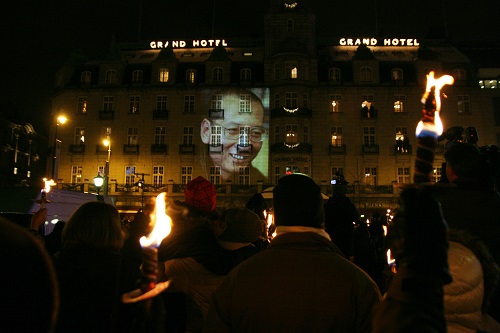Erik Brandsborg photo
By
Marguerite Guzman Bouvard
Liu Xiaobo
Returning from his studies at Columbia University
because he loved his country, he led
the 1989 Tiananmen Square Democracy movement
and cajoled the students to retreat, to stay alive,
when the army opened fire, then hauled him off
to prison, courage continually blossoming
in his heart, for this was just the beginning of his life’s
work, and imprisonment, yet there was a land within him
where justice reigned. In 2008 he was arrested yet again,
for his efforts on behalf of the rule of law and an end
to censorship. He remained incarcerated, separated
from a wife he cherished, for whom he wrote poems,
when he won the Nobel Prize for his endless struggles
on behalf of Democracy, where he warned
an enemy mentality can destroy a society’s tolerance
and humanity, at a time when populism flourished
in the West and “fake news” was rampant in our country,
and the word “we” crumbled in the battles between “us”
and “them,” where hatred defaced mosques and Jewish
cemeteries were defiled, and in a Kansas bar, an engineer,
Srinivas Kuchibhotla, was confronted with angry slurs
and shot to death — while Liu Xiaobo was suffering
from liver cancer insisting that he did not see
his prison guards as enemies, even though
he was not allowed to leave for proper medical care,
for in the darkness of his confinement, his soul
was illuminated. After he died, his lessons
and his life’s efforts remain timeless; that there is neither
East or West, that we all need to honor compromise,
and moderation, the oneness of our humanity.
There Are Stories
we turn away from when we would like
to have a glass of wine over a quiet table,
make a list of the week’s coming events.
We would like to be safe in world that continues
to defy us. But the world has its own
voices. After World War II, there was a trial
in Germany that captured our attention,
while members of the SS quietly
slipped away across borders and remained
anonymous. There are always trials, the ones
that take place in courts, and the trials
we live through when clouds bring
us heavy rain, the tears rolling under
our eyelids, when the defector from Syria
who slipped out with documents depicting
the thousands of prisoners that perished
in Bashar al-Assad’s prisons, and then stood
before the powerful in our country with his
photographs, telling them, My life is not more
valuable than the many who are being killed
inside the country. I died a hundred times
a day, and looking at these bodies broke
my heart — he who embraced the world
that thunders towards us with his open arms,
telling us that the darkness must never win.
Marguerite Guzman Bouvard
Marguerite Guzman Bouvard was a professor of Political Science and a Director of Poetry Workshops at Regis College, and a writer in residence at the University of Maryland. She is currently a Resident Scholar at the Women’s Studies Research Center at Brandeis University. She has received fellowships from the Radcliffe Institute for Advanced Study and the Wellesley College Center for Research on Women.
Marguerite’s latest book “Social Justice: The Power of Compassion,” addresses some of the most pressing problems facing our country today: the environment, immigration, racism and criminal justice. As a writer, she has published several books of poetry and numerous non-fiction books in a variety of fields. She has received grants for her poetry from the Puffin Foundation and the Danforth Foundation and has won awards for two of her poetry books. She has been a writer in residence at the University of Maryland and has had residencies at the MacDowell Colony, the Yaddo Foundation, the Djerassi Foundation, the Leighton Artists’ colony at the Banff Centre and the Virginia Center for the Creative Arts. Her poetry has been widely anthologized and published in literary magazines around the world for she considers herself a world poet.
Her non-fiction books are concerned with women and human rights. Her books and research about women working for human rights reveal that mothering is very often a part of feminism. She has also written about social justice, illness, and grief. Her concern for the human condition is a common theme that runs throughout her publications.
Marguerite’s books are available from Amazon.com via the attached link.



Dear Marguerite-- Your two poems are brilliant! Incredibly powerful, very moving and inspiring. And so timely. I will be sharing them with many colleagues and friends. Beautifully written lines like the ones below are haunting--as they should be. "..he warned an enemy mentality can destroy a society’s tolerance..." " ... for in the darkness of his confinement, his soul was illuminated...." ...."the thousands of prisoners that perished in Bashar al-Assad’s prisons, and then stood before the powerful in our country with his photographs, telling them, My life is not more valuable than the many who are being killed..." Thank you for expressing these important feelings and warnings in such a powerful way... All my best from your friend and admirer, Florence (Graves)